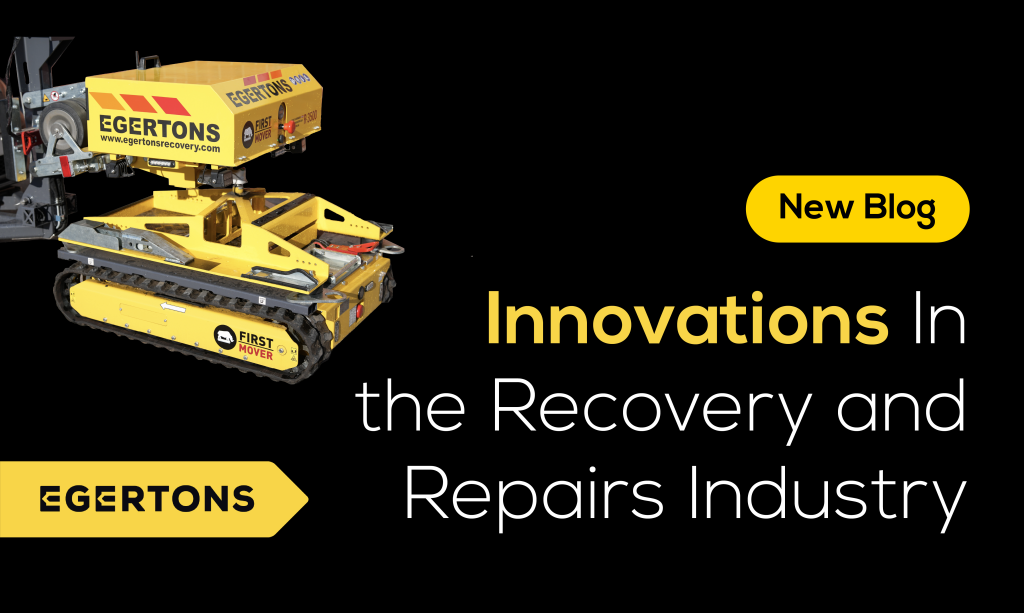The vehicle recovery and repairs industry has seen significant advancements in recent years, driven by technological innovation, sustainability goals and evolving customer expectations. Stretching from AI-driven diagnostics to electric recovery vehicles, the sector is undergoing a transformation that enhances efficiency, safety, and service delivery all at once.
Here, we explore the latest innovations shaping the recovery and repairs industry in the UK, kicking off with:
The rise of AI and telematics in vehicle recovery
Artificial intelligence (AI) and telematics have become game-changers in vehicle recovery, with many modern recovery operators now using AI-powered systems to assess roadside incidents in real time, providing immediate insights into a vehicle’s condition and the best course of action.
Alongside this, telematics technology allows for live tracking of recovery vehicles too, which enables fleet managers to allocate resources efficiently and reduce response times.
The result is that by integrating GPS and vehicle health monitoring, operators can predict breakdowns before they happen, minimising roadside emergencies and improving service reliability.
Electric and hybrid recovery vehicles
With the UK’s net-zero targets pushing for reduced emissions across all industries, the vehicle recovery sector is embracing electric and hybrid technology too, and recovery firms are beginning to explore adding electric recovery trucks to their fleets in an effort to reduce their carbon footprint whilst maintaining the same level of service.
In fact, many manufacturers are now developing heavy-duty electric vehicles capable of towing stranded cars without relying on fossil fuels. This shift not only contributes to environmental sustainability but also helps businesses comply with ultra-low emission zone (ULEZ) and clean air zone regulations in cities such as London, Birmingham and Manchester.
Smart diagnostics and remote repairs
Thanks to remote diagnostics tools, breakdown recovery is no longer just about towing vehicles to garages, as many issues can now be identified and even resolved on the roadside.
Advanced vehicle scanning technology allows technicians to access onboard diagnostics remotely, determining the nature of the fault before arriving on the scene, something which has been known to significantly reduced downtime for drivers and fleet operators, and in some cases, even allowing the option for software-based faults to be fixed via over-the-air updates, eliminating the need for physical intervention altogether.
Automation
Automation in vehicle repair workshops is another key innovation streamlining processes, as machinery can now perform precision-based repairs such as dent removals to wheel alignments, improving accuracy and reducing human error.
What’s more, 3D printing technology is also being used for manufactures hard-to-source vehicle components, helping garages speed up repairs and reduce reliance on lengthy supply chains – something which has proven particularly valuable amid recent supply chain disruptions.
Digital customer experience and AI chatbots
In an age of digital convenience, customer expectations for fast, seamless service are higher than ever, and as a result, the recovery and repair industry has responded by introducing AI-powered chatbots and mobile apps that provide instant roadside assistance, real-time updates, and digital invoicing.
Now, customers can now track their recovery vehicle’s arrival, receive digital estimates for repairs and even book services through AI-powered platforms, allowing for an enhanced user experience which helps recovery firms improve customer satisfaction and build long-term loyalty.
Advanced safety technology for recovery operators
Safety remains a top priority for recovery professionals working on busy motorways and accident-prone locations, so much so that smart personal protective equipment (SPPE) and vehicle-mounted hazard detection systems are being talked about highly for their success in improving roadside safety.
For example, collision-avoidance technology alerts recovery personnel when an oncoming vehicle is approaching too fast or too close, giving them extra time to react, and new automatic braking systems for recovery trucks help prevent secondary accidents during roadside operations.
If this wasn’t impressive enough, this technology is constantly evolving and new advancements are being made often, so who knows what other safety focussed tools could be coming up for us next.
Sustainable repairs and Circular Economy initiatives
Contrary to popular belief, sustainability is not just about electric vehicles (EVs), as many repair centres are now adopting eco-friendly repair practices such as water-based paints, biodegradable lubricants, and recycled vehicle parts.
Some recovery companies are also investing in energy-efficient workshops which use solar panels and LED lighting to reduce operational energy consumption and costs, all of which contribute to a Circular Economy where fewer resources are wasted.
As these innovations continue to develop, businesses that embrace new technologies will be best positioned to deliver superior service whilst remaining compliant with UK regulations and sustainability targets, so the future of the industry is certainly looking smarter, greener and more efficient.
At Egertons, we’re at the forefront of this transformation, combining decades of expertise with cutting-edge solutions to deliver safe, reliable vehicle rescue and recovery. Whether it’s roadside repair, specialist assistance, or securing a vehicle after an incident, our skilled team is equipped to handle any situation, 24/7/365, and no matter the change, we’ll be there to get you moving again.


